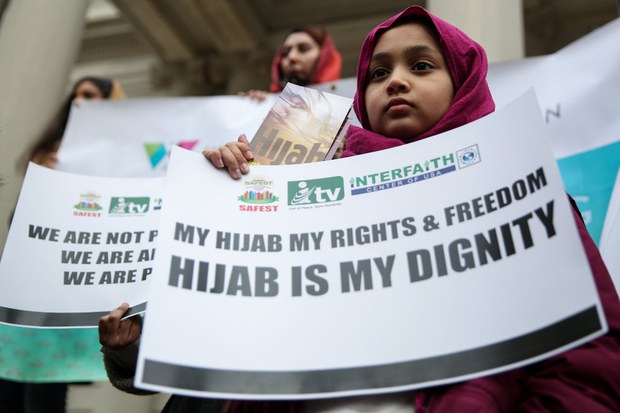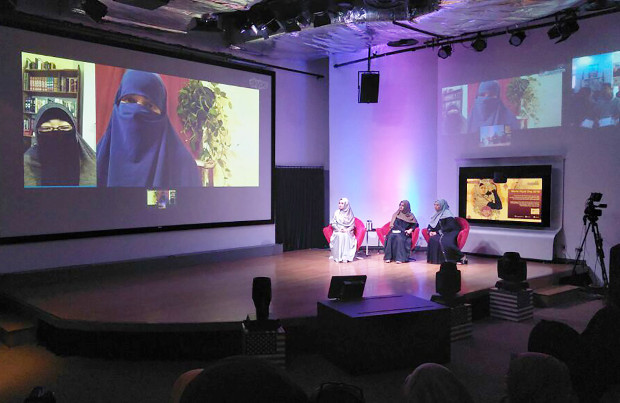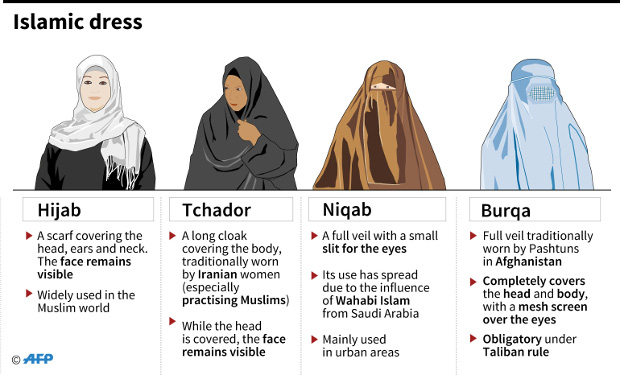Indonesian Women Journalists Join World Hijab Day Celebration
2018.02.01
Jakarta
 A Muslim girl holds a sign during a World Hijab Day rally in front of New York City Hall, Feb. 1, 2018.
A Muslim girl holds a sign during a World Hijab Day rally in front of New York City Hall, Feb. 1, 2018.
Celebrating World Hijab Day on Thursday, Muslim women journalists in Indonesia said they overcame hurdles in how some reacted to the way they dressed and are finding it easier to work while wearing headscarves.
The women are members of the Hijab-Wearing Journalists Community (KJB) founded by a handful of Indonesian women in 2012. Today, about 100 hijab-wearing women work in TV, radio, print and online media across the country.
“We’ve gone through all the challenges. Currently there are many women journalists who wear hijabs and they are professional and independent,” KJB leader Trifty Qurrota Aini told BenarNews.
A hijab is a traditional scarf that women in the Muslim world wear to cover their head, ears and neck while keeping their faces exposed.
“We are journalists and we are neutral, our activities consist of things related with education, social issues, religion and fashion.”
The celebration held at the U.S. Embassy’s cultural center in Jakarta featured an international Skype discussion and a video message from Nazma Khan, a Bangladeshi woman living in New York City who initiated the global event five years ago.
Khan, who moved with her family to New York City when she was 11, started World Hijab Day on Feb. 1, 2013, to allow women of all religions throughout the world to experience how others react to them wearing headscarves.
This year, 145 countries, including Bangladesh, India, Indonesia, Malaysia, the Philippines and Thailand hosted events to mark the day.
Founder’s story
About a year after she set up a website, worldhijabday.com, Khan posted a video to YouTube in which she recounted the taunts she had received beginning with her school days in New York.
“I had no idea a piece of fabric on my head would cause so much pain for the next several years,” she said, adding she was taunted by boys and girls alike. She used the boys’ entrance at school because she was afraid of the other girls.
Even a teacher mocked her for the way she dressed.
“He was supposed to protect me and help me boost my confidence,” she said. “He did the opposite by crushing my self-esteem.”
Khan said she could have dropped out, but instead finished first in her class. She started college in New York City around the time of the Sept. 11 attacks.
“Of course I could never avoid those stares,” she said of classmates and fellow New Yorkers.
Controversy
Across the world, hijabs have courted controversy.
Late last year, Malaysia’s tourism minister warned hotels to drop policies banning female employees from wearing hijabs while working the front desk.
Tourism Minister Mohamed Nazri Abdul Aziz issued his warning after a local union revealed that it had received complaints from female hotel employees, who said they had been prohibited from wearing headscarves while manning the front desk. Students in hospitality and tourism courses had also been told to remove their hijabs during internships or face the prospect of not being hired later.
More recently, women in Iran were arrested for removing their hijabs and waving them from sticks. Their acts of defiance were posted on social media sites.
At the same time, the French parliament adopted a “neutral” dress code banning lawmakers from wearing hijabs and other religious symbols. A government leader defending the code called it in line with a 2004 law banning students and teachers from wearing conspicuous religious symbols at school.

Tales of discrimination
At Thursday’s event in Jakarta, some participants shared their stories of discrimination for wearing a hijab.
KJB member Nikmatul Sholihah said she had a tough time applying for visas to countries where Muslims were in the minority.
Another participant said that even in Indonesia, a Muslim-majority country, she had experienced discrimination.
“I visited a university and there was one person staring at me from the top to the bottom,” Amanda Kusuma Wardhani told BenarNews.
Except for the conservative western province of Aceh, where sharia law is in force and Muslim women are required to wear the hijab, dressing with the headscarf is optional for Muslim women in other parts of Indonesia.
Trifty, the head of KJB, said Muslim women who wore hijabs could be stereotyped as radicals or even terrorists.
“This is the challenge for KJB on how we spread the spirit to Muslim women, especially as journalists who uphold the religion and must convince people that women in hijabs are not radical,” Trifty said.
She applauded the growing number of women who wear a hijab each day.
“Of course we are very happy. That means Muslim women with hijabs have been well received by companies and it is not regarded as something that hinders success,” the former television journalist said.
Amaliah Begum, Indonesia’s ambassador for World Hijab Day, told attendees they needed to prove that the negative stigma put on them by others was wrong.
“We should talk to them nicely, explain to them, and inspire them,” she said.








